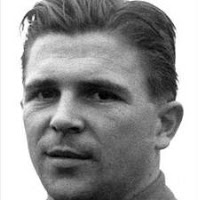FERENC PUSKAS
 |
| Ferenc Puskas |
Ferenc Puskas Biro was born in Budapest on April 2, 1927. His real surname was Purczfeld, German origin, but he changed Puskas (gun in Hungarian) after the Second World War.
Son of a famous soccer player of Northern Hungary, started playing soccer when he was a ball boy in the field of Kispest club in Budapest. At ten he was playing at that club, and at 16 made his debut in the Hungarian First Division, commanded by a coach known to him: his father. His left leg combined strength and precision and had unlimited resources. He played in this club from 1943 to 1949 when it was renamed Honved, the Hungarian Army team, and Puskas remained in it until 1956, reaching the rank of lieutenant colonel.
His career at this time was brilliant, especially in the Hungary selection. With the national team got the Olympic championship in Helsinki in 1952 and the historic 6-3 victory against England at Wembley (as captain) in December 1953. This national team was that dazzled the world at the 1954 World Cup in Switzerland, with players like Kocsis, Bozsik, Czibor or Hidegkuti, besides Puskas, getting second place in the world cup (after unexpectedly losing the final against Germany). This team was known as the "Magical Magyars".
His life changed the November 4, 1956, when the USSR invaded Hungary. On the way to Bilbao with his team, Honved, in the city of Vienna, Puskas and other partners as Czibor or Kocsis, deserted because of the invasion, earning a punishment of two years by FIFA. He left behind a balance of 349 league games with 358 goals, more than a goal per game.
Ferenc Puskas lived in several countries in Europe and South America until he was signed by Real Madrid, rejecting offers from several clubs in Italy. Thus, thirty-one years old he became Real Madrid player, completing the group was already legendary; Alfredo Di Stefano, Kopa, Rial, Santamaría, Gento, Dominguez ... It was quite a surprise to the Spanish fans, it was thought that a man like Puskas, at that time about to turn thirty-two years and overweight, had nothing to do at a team like Real Madrid, in full stars. But the time put everything in place and soon won the support and the sympathy of the fans, becoming "Pancho " Puskas.
During his first season in Spain had some adjustment problems resulting from his difficulties with the language and his long inactivity, but in his second year began to show signs of quality. Goals and more goals. A match for the story was when he participated in the fifth win for Real Madrid in the European Cup, this time playing the final at Hampden Park in Glasgow against Eintrach Frankfurt, which was defeated 7-3, with four Puskas' goals.
In the following five editions of Spanish League, Real Madrid won the titles, being Puskas the "Pichichi" in the seasons 60/61, 62/63 and 63/64, and winning the Spanish Cup in 1962. Later in1966, Real Madrid returned to win the European Cup, but Puskas did not play the final, as he did in his last season in white (1966/67) in which he only played friendlies.
With the fall of communism, in September 1992 he set residence in Hungary and incorporated in technical tasks of his national team. Ferenc Puskas died on November 17, 2006 in Budapest because of pneumonia. A few years before the death of this legendary player, in his honor, the National Stadium in Hungary changed its name to the Ferenc Puskas Stadium.
A legendary figure in world football, is considered one of the best players in history. He was elected by FIFA 'Top scorer' of the twentieth century in 2004 and ranks 6th in the ranking of the Best footballer of the twentieth century, published by IFFHS in 2004.

No comments:
Post a Comment